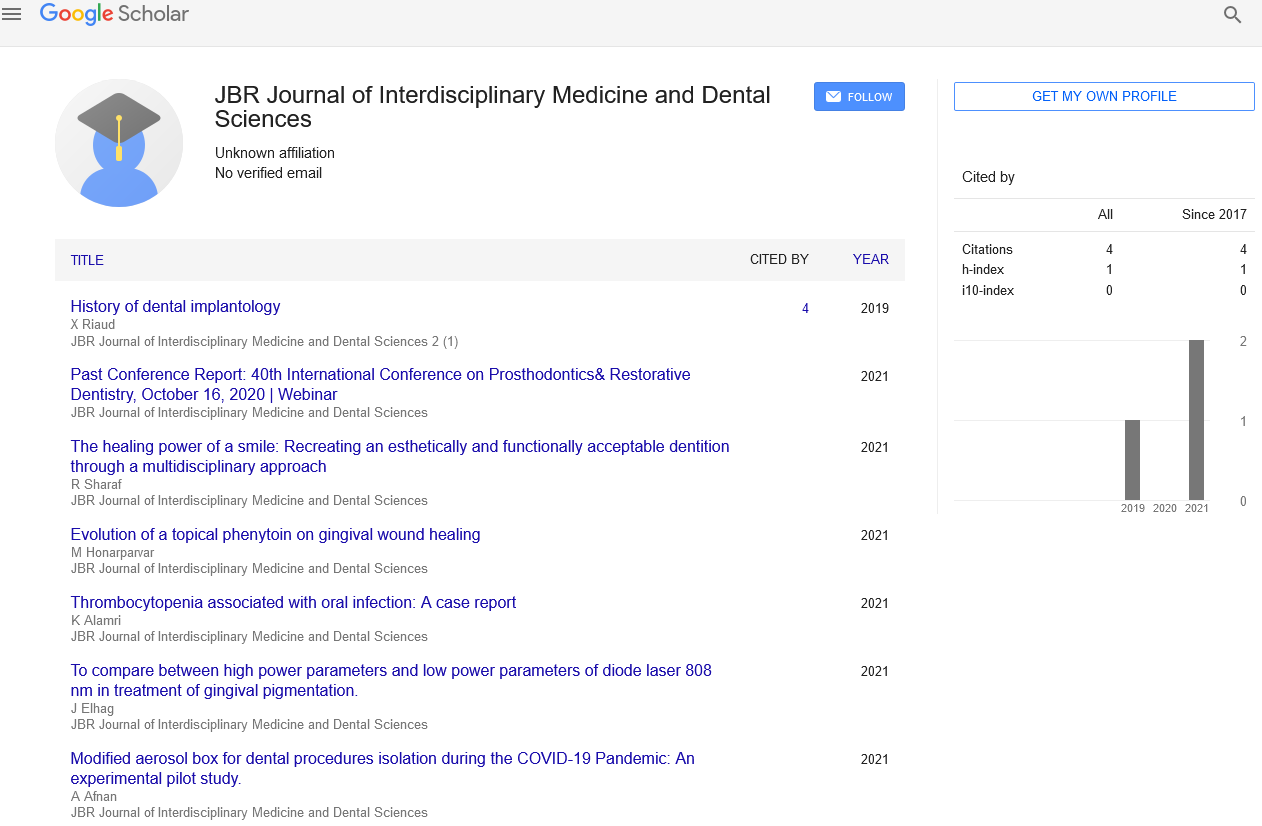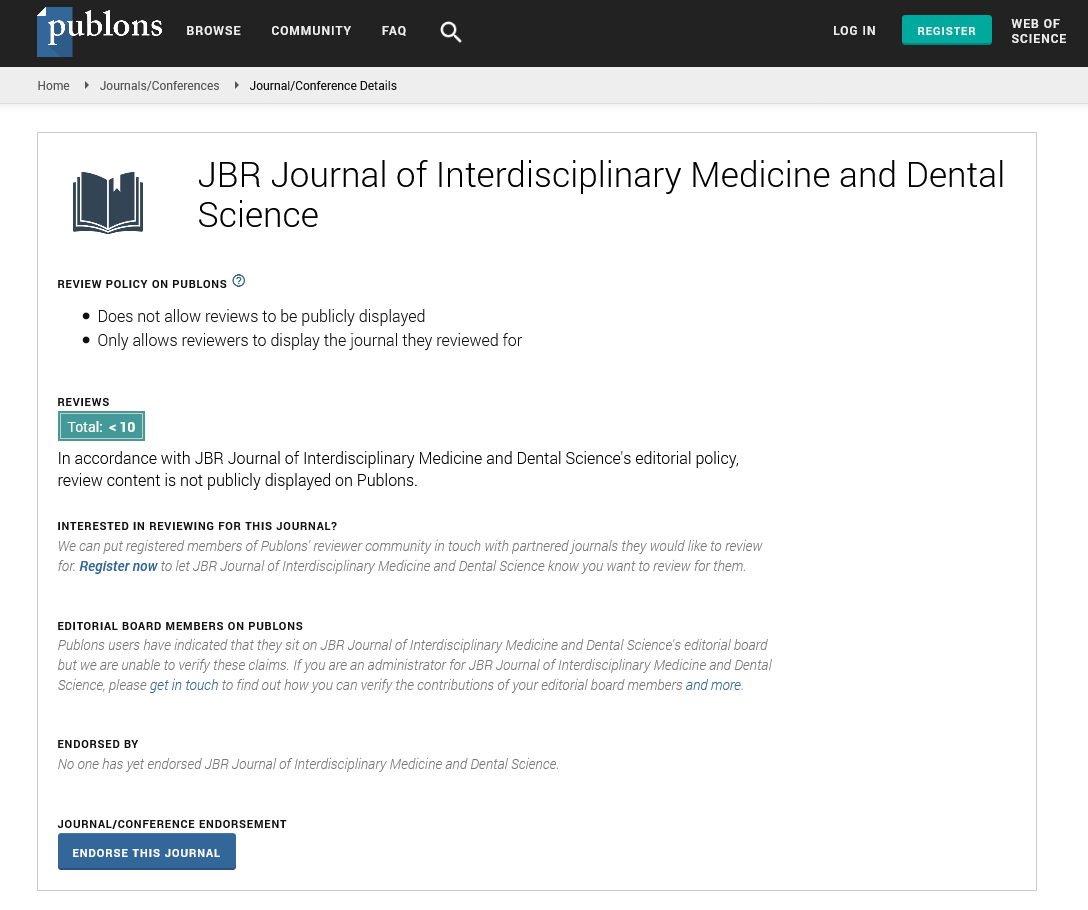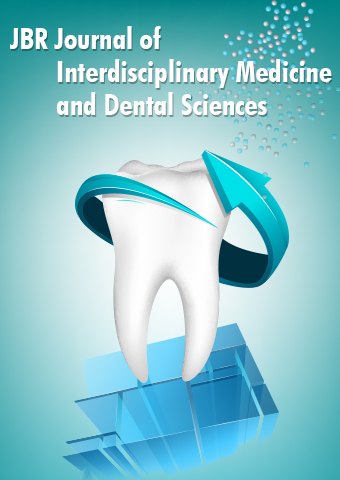Short Communication - JBR Journal of Interdisciplinary Medicine and Dental Sciences (2023) Volume 6, Issue 3
Exploring the Power of Integrative Medicine Healing Body, Mind, and Spirit
Nanda Theil*
Department of pharmacology, Serbia
Department of pharmacology, Serbia
E-mail: theil_nd13@gmail.com
Received: 01-May-2023, Manuscript No. jimds-23-100131; Editor assigned: 04-May-2023, PreQC No. jimds-23-100131 (PQ); Reviewed: 19-May-2023, QC No. jimds-23-100131; Revised: 24-May-2023, Manuscript No. jimds-23-100131 (R); Published: 30-May-2023, DOI: 10.37532/2376- 032X.2023.6(3).43-45
Abstract
This article explores the concept of integrative medicine, a holistic approach to healthcare that combines conventional medical treatments with evidence-based complementary therapies. Integrative medicine recognizes the interconnectedness of the body, mind, and spirit, and seeks to address the physical, emotional, mental, social, and spiritual aspects of health. The article discusses the key principles of integrative medicine, including patient-centered care, a holistic approach, evidence-informed practice, and personalized medicine. It highlights the benefits of integrative medicine, such as enhanced well-being, expanded treatment options, improved outcomes, preventive focus, and potential costeffectiveness. By embracing the integration of different healing modalities, integrative medicine has the power to transform healthcare and provide comprehensive care that nurtures the body, mind, and spirit.
Keywords
Integrative medicine • Holistic approach • Patient-centered care • Evidence-informed practice
Introduction
In recent years, there has been a significant shift in the way we approach healthcare and wellbeing. Traditional medical systems, while valuable in their own right, often focus solely on treating physical symptoms and diseases, neglecting the intricate connections between the body, mind, and spirit [1]. However, a new paradigm is emerging—one that recognizes the power of integration and the importance of holistic care. This article delves into the realm of integrative medicine, an approach that combines conventional medical practices with evidence-based complementary therapies to heal not just the body, but also the mind and spirit. Integrative medicine acknowledges that optimal health and well-being encompass more than just the absence of disease. It recognizes that our bodies are complex ecosystems influenced by various factors, including our emotions, thoughts, lifestyle, and spiritual beliefs [2]. By understanding and addressing the interconnectedness of these elements, integrative medicine seeks to provide a comprehensive approach to healing and wellness. At the heart of integrative medicine lies the principle of patient-centered care. This approach recognizes that each person is unique, with individual needs, preferences, and values. It fosters a collaborative relationship between healthcare practitioners and patients, empowering individuals to actively participate in their healing process [3]. By acknowledging the importance of the mind-body-spirit connection, integrative medicine aims to support patients in achieving not only physical health but also emotional well-being and spiritual growth. Integrative medicine embraces a range of evidence-based complementary therapies alongside conventional medical treatments. These complementary therapies may include practices such as acupuncture, herbal medicine, massage therapy, mind-body techniques like meditation and yoga, nutritional counseling and more [4]. By integrating these therapies with conventional medicine, patients are provided with a broader spectrum of treatment options, allowing them to explore interventions that align with their values and preferences. The benefits of integrative medicine are manifold. By adopting a holistic approach, it addresses the underlying causes of illness and imbalances rather than merely alleviating symptoms. This focus on root causes and individualized care can lead to improved outcomes and a higher quality of life for patients. Integrative medicine also emphasizes preventive care, encouraging lifestyle modifications and self-care practices to promote long-term health and well-being [5]. Additionally, the integration of complementary therapies into healthcare has the potential to enhance the effectiveness of treatments, reduce reliance on pharmaceutical interventions, and improve patient satisfaction. While further research is needed to fully understand the economic impact of integrative medicine, preliminary evidence suggests that it may contribute to cost savings by emphasizing prevention, reducing hospitalizations, and supporting self-care practices.
Material and Methods
Understanding integrative medicine
Integrative medicine is an approach to healthcare that combines conventional medical treatments with evidence-based complementary therapies. It seeks to address the physical, emotional, mental, social, and spiritual aspects of health, acknowledging that optimal well-being results from a harmonious balance of these interconnected elements [6]. By considering the whole person, integrative medicine fosters collaboration between patients and healthcare practitioners, aiming to empower individuals in their healing journey.
Integrative medicine operates on several core principles that guide its practice
Patient-centered care: Integrative medicine prioritizes the individual, considering their unique needs, preferences, and values. It recognizes that patients are active participants in their own healing process, promoting a collaborative relationship between the patient and the healthcare team [7].
Holistic approach
This approach focuses on treating the whole person, rather than just the symptoms or diseases. It recognizes that physical ailments are often influenced by emotional, psychological, and spiritual factors. By addressing the underlying causes and imbalances, integrative medicine seeks to promote healing and restore overall wellbeing.
Evidence-informed practice
Integrative medicine integrates the best available evidence from both conventional medicine and complementary therapies. It combines the scientific rigor of Western medicine with the wisdom of traditional healing practices, placing emphasis on therapies that have been studied and shown to be safe and effective.
Personalized medicine
Recognizing the uniqueness of each individual, integrative medicine tailors treatment plans to the specific needs and circumstances of the patient. It embraces a comprehensive assessment of factors such as lifestyle, genetics, environment, and emotional well-being to design personalized interventions [8].
Benefits and potential
Integrative medicine offers numerous benefits for patients, healthcare practitioners, and the healthcare system as a whole:
Enhanced well-being
By focusing on the interconnectedness of body, mind, and spirit, integrative medicine aims to promote overall well-being and quality of life. It empowers patients to take an active role in their health, encouraging self-care practices and lifestyle modifications [9].
Expanded treatment options
Integrative medicine integrates a wide range of evidence-based complementary therapies, such as acupuncture, herbal medicine, yoga, meditation, and nutritional counseling. This expands treatment options beyond conventional approaches, allowing individuals to explore interventions that align with their values and preferences.
Improved outcomes
Studies have shown that integrative medicine can lead to improved clinical outcomes. By combining therapies, addressing root causes, and supporting the body’s innate healing mechanisms, it may enhance the effectiveness of treatments and reduce reliance on pharmaceutical interventions.
Preventive focus
Integrative medicine emphasizes the importance of preventive care and lifestyle modifications to promote long-term health. By addressing risk factors, optimizing nutrition, and managing stress, it aims to prevent the onset of chronic diseases and promote overall wellness.
Cost-effectiveness
While further research is needed to assess the economic impact of integrative medicine, preliminary evidence suggests potential cost savings. By focusing on prevention, reducing hospitalizations, and encouraging self-care practices, it may lead to a more sustainable healthcare system [10].
Discussion
In an era where health and wellness are gaining increasing importance, there is a growing recognition of the interconnectedness of the body, mind, and spirit. Traditional healthcare systems have predominantly focused on treating symptoms and diseases, often overlooking the holistic nature of human well-being. However, a paradigm shift is underway, and integrative medicine is emerging as a powerful approach that embraces the integration of conventional and complementary therapies to provide comprehensive care. This article delves into the world of integrative medicine, highlighting its principles, benefits, and potential for transforming healthcare.
Conclusion
Integrative medicine holds immense promise in transforming healthcare by recognizing the interconnectedness of the body, mind, and spirit. Through its patient-centered approach, holistic perspective, evidence-informed practice, and emphasis on personalized medicine, it offers a comprehensive and empowering model of care. By integrating conventional medical treatments with evidence-based complementary therapies, integrative medicine addresses the root causes of illness, promotes preventive care, expands treatment options, and enhances overall well-being. The power of integrative medicine lies in its ability to provide a more comprehensive understanding of health and healing. By acknowledging the intricate interplay between physical, emotional, mental, social, and spiritual factors, it fosters a more holistic and compassionate approach to patient care. Integrative medicine empowers individuals to take an active role in their healing process, encouraging self-care practices, lifestyle modifications, and the exploration of therapies that align with their values and preferences. Moreover, integrative medicine has the potential to improve clinical outcomes by combining therapies, supporting the body’s innate healing mechanisms, and reducing reliance on pharmaceutical interventions. By addressing the underlying causes of illness, it not only alleviates symptoms but also promotes long-term health and wellness. While challenges and questions remain, such as the need for further research and the integration of integrative medicine into mainstream healthcare systems, the growing recognition of its benefits and the increasing demand for holistic care indicate a positive shift in the healthcare landscape. Integrative medicine offers a powerful framework for healing the body, mind, and spirit. By embracing the integration of conventional and complementary therapies, it has the potential to revolutionize healthcare by providing comprehensive, patient-centered, and holistic care. As we continue to explore and understand the power of integrative medicine, it holds the promise of transforming healthcare and nurturing well-being at all levels of our being.
References
- Petersen PE, Yamamoto T. Improving the oral health of older people: The approach of the WHO Global Oral Health Programme. Community Dent Oral Epidemiol. 33, 81–92(2005).
- Nascimento GG, Leite FRM, Vestergaard P et al. Does diabetes increase the risk of periodontitis? A systematic review and meta-regression analysis of longitudinal prospective studies. Acta Diabetol. 55, 653–667(2018).
- Cassolato SF, Turnbull RS. Xerostomia: Clinical Aspects and Treatment. Gerodontology. 20, 64–77(2003).
- Tavares M, Calabi KAL, Martin LS. Systemic Diseases and Oral Health. Dent Clin N Am.58, 797–814 (2014).
- Preshaw PM, Alba AL, Herrera D et al. Periodontitis and diabetes: A two-way relationship. Diabetologia. 55,21–31(2011).
- Qiao Y, Wang Z, Li Y et al. Rheumatoid arthritis risk in periodontitis patients: A systematic review and meta-analysis. Jt. Bone Spine. 87, 556–564 (2020).
- Hussain SB, Botelho J, Machado V et al. Is there a bidirectional association between rheumatoid arthritis and periodontitis? A systematic review and meta-analysis. Semin Arthritis Rheum. 50, 414–422 (2020).
- Petersen PE, Bourgeois D, Ogawa H et al. The global burden of oral diseases and risks to oral health. Bull World Health Organ. 83, 661–669(2005).
- Kailembo A, Preet R, Williams JS (2017) Common risk factors and edentulism in adults, aged 50 years and over, in China, Ghana, India and South Africa: Results from the WHO Study on global AGEing and adult health (SAGE). BMC Oral Health. 17, 1–16.
- Glick M, Williams DM, Kleinman DV et al. A new definition for oral health developed by the FDI World Dental Federation opens the door to a universal definition of oral health. J Am Dent Assoc. 147,915–917(2016).
Indexed at, Google Scholar, Crossref
Indexed at, Google Scholar, Crossref
Indexed at, Google Scholar, Crossref
Indexed at, Google Scholar, Crossref
Indexed at, Google Scholar, Crossref
Indexed at, Google Scholar, Crossref
Indexed at, Google Scholar, Crossref
Indexed at, Google Scholar, Crossref


